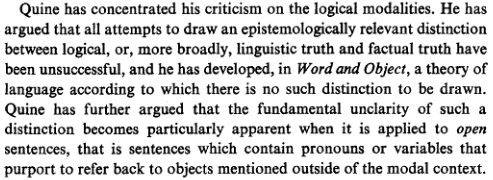At the end of this video on Quine's critique of the analytic/synthetic distinction, there is an argument about why logical truths are suspect, because of Quine's critique:
Quine's argument also threatens the idea of logical truths -- what Quine called analytic statements of the first class [...] [Quine] grants logical truths. But we might think that there is a bit of a problem here. Let's take a logical truth of the form $∀x (Vx → Vx)$ or "if x is a vixen then x is a vixen" or more colloquially "all vixens are vixens"... but this only works if each instance of "vixen" has the same meaning. If the first token of vixens means female foxes and the second token of vixens means attractive women, then obviously this statement is false.
Ordinarily, we would say that this kind of thing is not a counter example to logical truths because it would be equivocating on the term vixen. When we characterize logical truths we have to specify the different tokens of the same expression have the same meaning. It must be the first token of vixen is synonymous with the second token of vixen. Without sameness of meaning it is not quite so obvious how we are to understand logical truths.
I have a bit of a trouble interpreting what is being said above. Specifically, what does the speaker mean when he says If the first token of vixens means female foxes and the second token of vixens means attractive women, then obviously this statement is false? What is the first and second token in the sentence "all vixens are vixens", and why they can have different meanings? I understand how in general in our language the word "vixen" might have different meanings, but how can it change in a sentence such as "if x is a vixen then x is a vixen"? To me, when I read the sentence the word "vixen" represents a label of some category, it doesn't matter how the category is defined or whether the definition is correct. What matters is that there is a definition and it has the label "vixen" slapped on it and x might match that definition or not.

